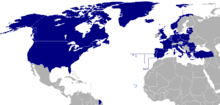Years ago the comic strip Doonesbury ran a segment lampooning the political appointment of U.S. ambassadors. In the storyline, government officials of an unnamed country strive to maintain secret connections with a lower level American diplomat. They seek to bypass the appointed ambassador, a know-nothing doofus named because he gave money to a political campaign.
One might expect corrupt dictatorships to send politically connected hacks to serve as ambassadors. But do we want to imitate them?
 How about our democratic allies? What kind of people do these countries appoint as ambassadors TO the United States? According to a recent study of ambassadors from NATO countries (May 2014 issue of The Foreign Service Journal), not a single one serving at the time was politically appointed.
How about our democratic allies? What kind of people do these countries appoint as ambassadors TO the United States? According to a recent study of ambassadors from NATO countries (May 2014 issue of The Foreign Service Journal), not a single one serving at the time was politically appointed.
Peter Bridges, a retired career ambassador, wrote in a recent article on the Internet: “In all of our republic’s history, only one career Foreign Service officer has ever been our ambassador to the United Kingdom—our most important ally. . . . In contrast, the British almost invariably send one of their most experienced career diplomats to Washington.”
On average, around one third of U.S. ambassadors are appointed for political reasons, usually because they give money to political campaigns. Democratic and Republican presidents are equally guilty in the appointment of favorites instead of career Foreign Service officers who’ve spent years serving in countries all over the world and learning how to deal with foreign governments.
We don’t appoint generals because they give money to a political party. Even in corporations, where money matters a great deal, managers usually are chosen for their skills. Why should it be different for ambassadors?
Of course, political ambassadors are generally not appointed to dangerous countries like Libya, where career ambassador Chris Stevens was murdered by terrorists.

